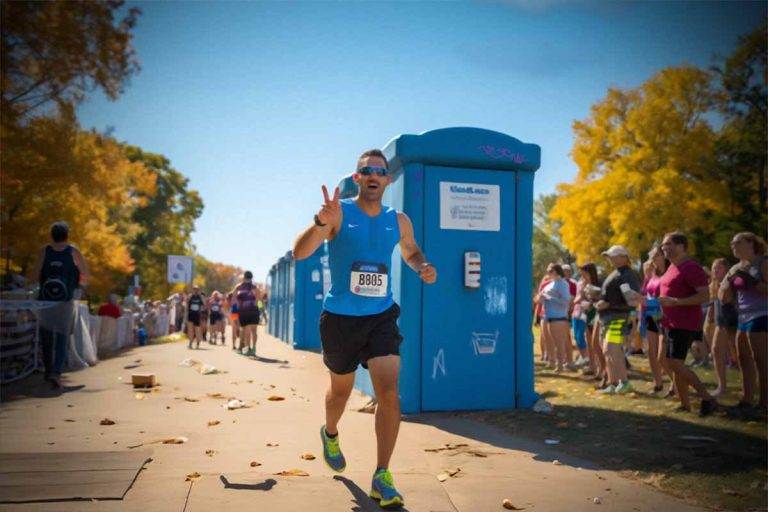How Long Does It Take To Walk A Marathon? Don’t Miss the Time Limits!

Are you dreaming of a marathon but unsure if you’re fit enough? Or if your legs can handle it? What if you walk the whole way?
Completing a marathon just by walking certainly requires some training and reasonable fitness. Still, it is gentler on the legs and body – and offers at least the same health benefits as running.
But how long does it take to walk a marathon?
Marathon Walking: How Long Does It Take for Fast and Casual Walkers?
Walking a marathon usually takes between 6 and 8 hours.
However, the people who manage to walk the marathon in 6 hours will be those who keep an extremely fast walking pace. The more casual walkers will be clocking in around the 7 or 8 hours mark.
While these are fine times, you must ensure they don’t exceed any specific cutoff time for your particular marathon.
There’s plenty more to learn about walking marathons, and you’ll find all the answers and more in our handy guide below. Read on!
Are You Allowed To Walk A Marathon?
When most of us picture a marathon, we will see people running or jogging the whole distance. However, this isn’t really the case, since a lot of people will walk marathons instead, or use a combination of running and walking.
Walking is completely allowed in marathons, thankfully, which makes the events a much more inclusive and welcoming thing.
Walking might seem like it’s a much easier way to complete a marathon than running, but it’s still not going to be a breeze.
Walking or not, a marathon is still an enormous distance, and completing it all will take a considerable effort from anyone.
In this article, you can read more about how the marathon length has become 26.2 miles (42.2 kilometers).
From Head to Toe: The Benefits of Walking a Marathon
Lower impact on the body: When compared to running, walking a marathon has a lower impact on the joints and muscles. This makes it an excellent choice if you are recovering from an injury or have underlying health issues that running may aggravate.
Suitable for all fitness levels: Because walking is a relatively low-intensity exercise, it is ideal for all fitness levels. This means you can train to walk a marathon, regardless of your fitness level or age.
Can be easier on the mind: Walking a marathon may be easier to manage mentally than running. This can be especially true if you are new to endurance events.
There are a handful of benefits to completing a marathon by walking, which is why it’s become such a popular method for people to follow.
1. Health
For one thing, walking is much less stressful and exhausting than running. Running has an enormous amount of benefits, but it’s going to be difficult no matter how fit you are, so walking takes some of the pressure off.
However, the pressure isn’t removed entirely, because walking 26.2 miles is still going to be a test of your endurance.
On top of that, some people might be suffering health issues that mean they can’t run very much at all.
For these people, it’s important that they still feel they can complete a marathon, despite not being physically capable of running.
Similarly, people who are getting healthy again after an injury or giving birth will also need an easier way to complete a marathon.
2. Helping Others
Marathons are also a brilliant way for people to raise money for charities, with friends and family sponsoring their participation in the event.
However, the important thing in these cases is the money and it going to people who need it, not the way in which the sponsored person completes the marathon. As long as they’re taking part, walking or running, then it’s worth it.
3. Socializing
Marathons are also a great source of fun and socializing.
Whether you’re doing it with friends, or simply meeting new people there, then it’s a great way to find yourself surrounded by other like-minded people and really feel like you’re part of something special.
Feeling you have to run the marathon could put some people off, and so the ability to walk makes this social experience a lot more welcoming.

What Is The Downside Of Walking A Marathon?
There is one important thing you need to remember if you’re going to walk a marathon, and that’s the cutoff time.
- Every marathon will have a different cutoff time, meaning that there is a certain time frame you have to complete it in.
- Some marathons will be stricter than others, and some may even force you to travel on a sweeper car or a broom wagon if you’re falling behind the slowest time.
Since a person is likely to walk a marathon anywhere between 6 and 8 hours, you need to make sure that the specific marathon that you’re taking is not going to have a cutoff time shorter than that.
For example, your marathon might have a cutoff time of 7 hours, which would make walking it very difficult.
At the bottom of this article, you will find a link to another piece of article that mentions the top 10 walker-friendly marathons with their cut-off times.
Do You Need To Train For Walking A Marathon?
You might assume that walking a marathon won’t need training, since it’s easier than running, but that isn’t the case.
Since a marathon is still an enormous distance, you will need to train properly for it, even if you’re walking it.
The training doesn’t have to be too extreme, but you do need to be physically fit enough, and have experience of walking long distances.
If you don’t have the experience, see a doctor and have them confirm that you should be able to manage.
If you are physically fit and experienced, then you probably won’t need to train. Similarly, if you don’t have underlying medical conditions, or any underlying injuries, then you will likely not need to train.
Walking a marathon without the proper fitness could result in injuries, which could prevent you from taking part in other marathons in the immediate future.
What Fuel Do You Need To Walk A Marathon?
Since it takes 6-8 hours to walk through a marathon, you need the right kind of fuel along the way to keep you going the whole way. High-energy snacks will do the trick, like pretzels or energy bars.
As you’re walking, try to take in 30 grams of carbs every hour from any reliable source. Carbohydrates are our main energy source, and regularly getting them will help you to walk the extended distance much more easily.
Final Thoughts
Many people will picture a marathon as something you run, but here is no shame in walking a marathon. Walking offers the same health benefits as running, and in addition, walking avoids injuries and speeds up recovery.
- If you’re walking a marathon, then you should be able to complete it between 6 and 8 hours.
- Many marathons have time limits between 6 and 7 hours, so if you are walking, be prepared for a brisk walk.
- If this is your first marathon, choose one with an extended time limit (7 hours or more would be best).
- Some walker-friendly marathons (like Honolulu) have no time limit.
Check this article’s list of the top 10 walker-friendly marathons and their time limits.






